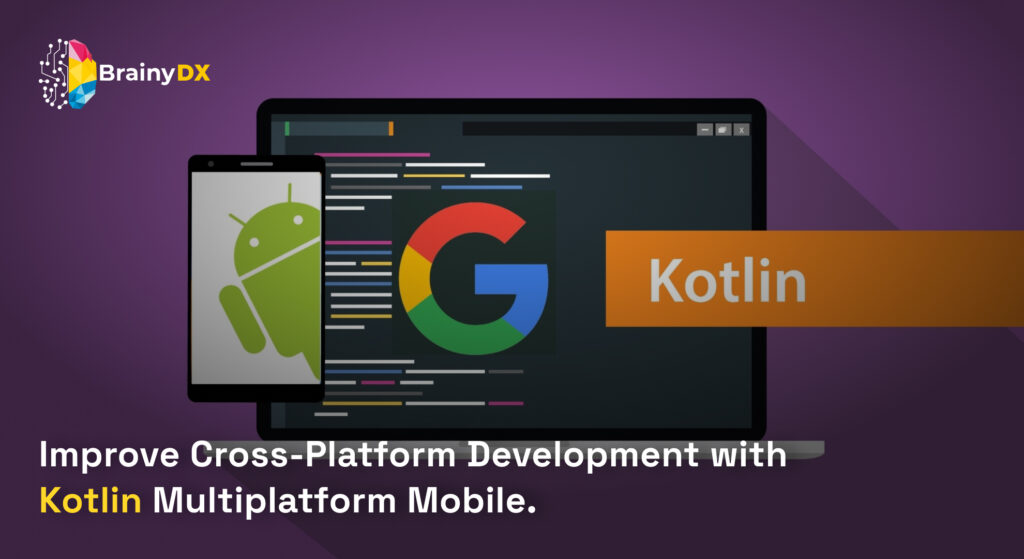
Improve Cross-Platform Development with Kotlin Multiplatform Mobile.
What is KMM (Kotlin Multiplatform Mobile)?

KMM, short for Kotlin Multiplatform, is an innovative mobile app development approach that combines native and cross-platform methods. It allows for writing common server logic across multiple platforms, facilitating data exchange between the app and server. However, the UI components remain platform-specific, with separate codebases for iOS and Android.
Easy Integration:
Kotlin Multiplatform (KMM) provides a smooth integration into your current Android projects, enabling you to embrace it gradually. No need for a sudden plunge; start by sharing smaller components, easing into the KMM workflow at your own pace.
As developers grow more confident and adept with Kotlin Multiplatform (KMM), they can gradually expand its utilization, eventually culminating in a fully unified codebase. This adaptable approach enables developers to harmonize the benefits of cross-platform development while preserving the familiarity of their established Android projects.
Code Reusability:
Kotlin Multiplatform (KMM) empowers developers to write code that seamlessly operates across various facets of a mobile app. Whether it’s tackling business logic, data management, or networking, KMM has you covered. This shared codebase revolutionizes app development.
By utilizing the same codebase across platforms, KMM significantly reduces redundancy in the development process. No more writing and maintaining separate code for iOS and Android, saving time and effort. But the benefits extend further. KMM ensures consistency between platforms, maintaining a uniform user experience for all users.
Moreover, this shared codebase simplifies app maintenance. With fewer lines of code to manage and fewer chances of errors, keeping the app up-to-date and bug-free becomes easier. KMM streamlines development workflow while enhancing app quality and reliability. It’s a win-win for developers and users.
Native Performance:
Unlike some cross-platform solutions that rely heavily on web-based technologies, KMM adopts a unique approach. It empowers developers to leverage the strengths of each targeted platform fully. With KMM, developers can access the native capabilities, APIs, and libraries of each platform. This ensures that the application maintains the speed, performance, and user experience associated with native apps. Additionally, KMM enables code sharing, streamlining development efforts and reducing redundancy, ultimately saving time and resources. In essence, KMM offers the best of both worlds, facilitating the creation of high-quality cross-platform apps that are efficient and user-friendly.
Efficient Development:
Imagine a scenario where developers collaborate on a single codebase, simplifying the management of separate codebases for Android and iOS. This is precisely what KMM offers. With KMM, development becomes streamlined, resulting in faster cycles and reduced maintenance overhead. By leveraging KMM, developers can focus on building exceptional features and user experiences, while worrying less about platform-specific code intricacies. In essence, KMM enables teams to work smarter and more cohesively, leading to robust and agile app development.
Support for UI:
While KMM focuses on sharing business logic across platforms, it also addresses the UI aspect. With SwiftUI for iOS and Jetpack Compose for Android, developers can extend code sharing to include UI components. This enables a streamlined and unified user interface across platforms, leading to a more consistent and efficient development process. By leveraging SwiftUI and Jetpack Compose, you can create a shared UI codebase, reducing redundancy and ensuring a cohesive user experience. This enables swift and consistent implementation of changes and updates across iOS and Android platforms. Maintenance is simplified, as updates need only be made in one place, propagating seamlessly to all supported platforms. The integration of SwiftUI and Jetpack Compose in KMM’s toolkit fosters collaboration between iOS and Android development teams, enhancing code sharing and promoting synergy between platforms. This synchronized approach saves time and effort, facilitating efficient cross-platform app development. KMM, with its focus on both business logic and UI, empowers developers to create applications that are efficient, consistent, and user-friendly across platforms.
Rich Ecosystem:
Kotlin boasts a vibrant ecosystem that unlocks endless possibilities with KMM. With KMM, you tap into a diverse range of libraries and tools to enhance your development process. Among them are popular favorites like Retrofit, Room, and Kotlinx. Serialization, seamlessly integrated into KMM projects. These libraries, widely embraced in the Android and Kotlin communities, offer reliable solutions for network communication, local data storage, and efficient data serialization. By leveraging KMM alongside these trusted tools, you’re not just developing mobile apps; you’re crafting versatile, high-quality software accessible to both Android and iOS audiences effortlessly.
Shared Business Logic:
KMM, or Kotlin Multiplatform Mobile, is your reliable ally for sharing the inner workings of your app. It’s the secret ingredient that powers your app’s functionality seamlessly, from intricate business logic to essential data models and networking code. In essence, it’s your centralized hub for code-sharing excellence.
With KMM, you’re not just saving time and effort; you’re maximizing your code-sharing potential. This translates to fewer duplicated lines of code, minimized errors, and an overall more efficient development process. Whether you’re developing for iOS, Android, or any other Kotlin-supported platform, KMM streamlines your workflow and ensures optimal app performance across the board. It’s like having a coding companion that helps you prioritize creating an exceptional user experience.
Cost Savings:
Kotlin Multiplatform Mobile (KMM) offers a great chance to reduce the expenses linked with app development and continuous upkeep. Time is precious in mobile app development, and KMM helps conserve both. By enabling code sharing across platforms like Android and iOS, you significantly reduce development efforts. This boosts the efficiency of your development team, accelerating the app’s time-to-market.
Yet, the advantages extend beyond development. KMM simplifies maintenance by consolidating codebases. Managing a single codebase is far less complex than handling multiple ones for different platforms. This streamlines updates, bug fixes, and feature enhancements, resulting in long-term cost savings.
In essence, KMM is more than a cost-saving tool; it’s a strategic investment streamlining your mobile app development journey, making it more efficient and ultimately, more cost-effective.
Faster Time-to-Market:
Embracing code sharing in your development strategy yields remarkable benefits. Picture seamlessly introducing cutting-edge features on both Android and iOS platforms simultaneously.
Conclusion
In summary, Kotlin Multiplatform Mobile (KMM) marks a significant advancement in mobile app development. As outlined throughout this blog, its impact is revolutionary. KMM presents an opportunity to transform the way we build mobile applications, a moment that demands our attention.
With KMM, we unlock seamless code sharing across platforms, streamlining development and conserving time and resources. This technology bridges the gap between Android and iOS, expanding our reach in the market and catering to a diverse user base more efficiently.
It’s time for developers and businesses to embrace KMM’s potential. It’s not just a passing trend; it’s a strategic shift towards more efficient, cost-effective, and impactful mobile app development. By embracing KMM, you position yourself at the forefront of innovation in the mobile app industry.
So, don’t hesitate any longer. Dive into KMM, explore its capabilities, and join the movement reshaping the future of mobile app development. The advantages are evident, the possibilities endless, and the time is ripe to seize this opportunity and leave your mark on the mobile app landscape.
Frequently Asked Questions
1. What is Kotlin Multiplatform Mobile (KMM)?Contact us for a free consultation to discuss your mobile app development needs and explore if KMM is the right fit for your project.
KMM is an open-source framework by JetBrains that allows developers to share code between Android and iOS platforms for mobile app development. It enables developers to write common logic like business rules, data models, and networking code in a single codebase that can be used across both platforms.
2. What are the advantages of using KMM?
- Reduced development time and cost: By sharing code, developers can significantly reduce the time and resources needed to develop and maintain separate codebases for Android and iOS.
- Faster time to market: With a single codebase, updates and new features can be released simultaneously on both platforms, leading to a faster time to market.
- Consistent user experience: KMM helps ensure a consistent user experience across platforms, as the shared codebase guarantees the same core functionalities regardless of the device.
- Native performance: KMM allows developers to access platform-specific features and libraries, ensuring the app maintains native performance and user experience.
- Reusable code: KMM promotes code reusability, reducing redundancy and simplifying maintenance.
3. What are the limitations of KMM?
- Limited UI sharing: While KMM can share business logic, UI development remains platform-specific, requiring separate codebases for UI components like layouts and views. Frameworks like SwiftUI and Jetpack Compose can partially address this by facilitating code sharing for some UI elements.
- Learning curve: Developers need to learn the KMM specific syntax and tooling, which can add to the initial learning curve.
- Not suitable for all apps: KMM might not be the best choice for apps heavily reliant on platform-specific features or with complex UI requirements.
4. How does KMM integrate with existing Android projects?
KMM integrates seamlessly with existing Android projects. Developers can start by sharing smaller components and gradually expand KMM usage as they gain comfort and expertise.
Contact us for a free consultation to discuss your mobile app development needs and explore if KMM is the right fit for your project.



